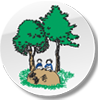
| Mathematics at Lawley Primary School |
Our school vision
| The whole school community at Lawley have high expectations for our children, and strive to ensure they leave school as confident, polite and independent young people, with the appropriate skills, values and learning to become successful in whatever their future will be. We aspire to instil in all our children a desire to never stop learning and to have the courage to succeed in whatever they do, across all areas of school life and beyond. At Lawley we are ‘Planting the seeds, growing the future.’ |
Led by Clair Pollitt
Intent
At Lawley Primary School we are 'planting the seeds, growing the future' and we aim for all our pupils to be confident, independent learners in mathematics.
We foster an enthusiasm for mathematical learning and an understanding of how maths is used in everyday life. We aim to for children to become resilient, lifelong learners in Maths.
We use WhiteRose Maths materials to plan engaging and inspiring lessons to address the knowledge, skills and concepts of the National Curriculum, which are at the core of our mathematics teaching.
We aim for our pupils to reach their full potential in mathematics, becoming fluent in the fundamentals of the subject through varied and frequent practice of increasingly complex problems. They are given daily opportunities to reason mathematically and to solve problems using a range of effective and efficient strategies.
Implementation
Our mathematics curriculum is supported by WhiteRose Maths materials from Nursery and EYFS to Year 6 and follows the guidance provided in the National Curriculum.
In Early Years, we use WhiteRose materials to support the delivery of the EYFS statutory framework, Birth to Five matters and Development Matters objectives. They support maths planning to support pupils to achieve the Early Learning Goals at the end of Reception. The long-term plan for EYFS identifies the progression of mathematical learning, knowledge and skills across the year and the fictional texts and child-led activities that are used to support and compliment the learning for each half term.
In Key Stage 1 and 2, we continue to use White Rose Maths planning materials. Each unit of maths allows pupils to study the topic in depth and allow time for consolidation and mastery of new skills. In addition to daily Flashback activities, our daily starters are carefully planned and spaced over time to allow for consolidation of previous learning and regular assessment opportunities of pupils’ retrieval skills. Each lesson also includes connect activities to explicitly model and explore connections between previous mathematical learning and the current lesson.
At Lawley, all pupils are taught through whole class interactive teaching where they work together towards the same goal and celebrate their successes. From Year 2, pupils also engage with one-to-one devices within lessons which facilitate regular opportunities for self-assessment for learning and peer interaction.
Lessons are designed to teach key points, identify misconceptions and move through a sequenced learning journey, which is supported by key questioning, tasks, explanations, clear modelling and discussion. Pupils use concrete apparatus to support conceptual understanding and physical learning where appropriate. Pictorial representations, scaffolds and images are used throughout lessons.
Mental maths strategies are given a high profile in our school and are taught explicitly each day. Our EYFS pupils follow the Mastery in Number programme to develop secure subitising skills and number fact recall and understanding. In KS1 we then use the Fluency Bee materials from WhiteRose to continue the explicit maths skills daily instruction and rehearsal. In years 3 and 4, pupils follow the Number Sense Times Table programme to ensure that table facts are taught and embedded by the end of LKS2. Consolidation of these tables facts is continued throughout Years 5 and 6 using Number Sense materials to ensure automaticity. Years 5 and 6 also follow a detailed arithmetic progression map to ensure the continued development of their mental maths skills.
Impact
In mathematics pupils demonstrate their learning in every lesson. To monitor pupil’s attainment and progress, internal school data is collected 3 times a year and is based on class teachers’ formative assessment as well as summative assessment results. Pupil voice is carried out alongside book monitoring to examine the day-to-day view of maths in the classroom and review children’s learning and progress.
Formative assessment is an integral part of each lesson through targeted questioning during lessons, observations of pupils, review of work and discussions. Lesson starters are used to continually revisit key skills and knowledge taught previously and offer the opportunity for teachers to assess pupil attainment and progress daily. Through the I do, We do, You do section of our lesson cycle, assessment for learning takes place within each lesson. Daily marking of work ensures that pupils are identified for immediate intervention activities where appropriate.
Continual assessment of mental maths progress is an integral part of both the Mastery in Number, Fluency Bee and Number Sense programmes and informs daily intervention plans for pupils.
Summative assessments are used by teachers at the end of each term in every year group, with Years 2 and 6 completing the national curriculum tests. In EYFS we carry out teacher assessments against our progression document at the end of each term. We also complete a baseline assessment in line with government guidelines.
The implementation of this curriculum ensures that, by the time children leave Lawley Primary School, they are:
- Resilient learners that can make links and connections between key areas of mathematics.
- Secure and fluent in their recall of arithmetic skills and have an ability to problem solve.
- Able to see how mathematics is relevant to their future life.
- Confident learners that enjoy mathematics.
